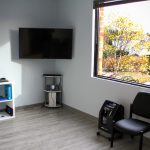Behavioral/Mood
Gain control. We can help restore full neurological functionality for conditions dealing with:
- Movement Disorders
- Anxiety
- Depression
Request Appointment
Movement Disorders
What is a Movement Disorder?
“Movement Disorders” is a very broad term referring to an abnormal movement as a result of an issue involving the nervous system. Issues with anatomical structures or chemical imbalances can differ between movement disorders.
Addressing Movement Disorders
Due to the fact that movement disorders can vary so much from each other, it’s imperative that we identify the root cause. The cause of the abnormal movement could be physiological/structural or biochemical in nature. Physiological causes usually relate to an area of the brain called the basal ganglia and commonly result in one sided movement disorders (e.g. only the left side). This could be caused by something recent like a concussion or could be long building like a developmental issue. Chemical causes of movement disorders usually involve the dopaminergic system and cause more of a bilateral (equal on both sides) presentation. Autoimmunity can play a role as well, such as in Pediatric Autoimmune Neuropsychiatric Disorders Associated with Streptococcal Infections (PANDAS).
Recovery from Movement Disorders
With any movement disorder, our goal is to eliminate the abnormal activity completely. Some conditions are easier to accomplish this with than others. For example, we expect a child with tics to be able to recover notably whereas an older individual with Parkinson’s we are hoping to just make a reduction in the frequency and severity of the movements. This is where having clear communication of treatment goals and expectations becomes very important.
About Interactive Neurology
We provide treatment to those who battle chronic pain or illness, where all other options have been exhausted. We start by determining the root of the illness rather than addressing just symptoms. We provide a completely personalized course of treatment that correlates with your specific condition and personal needs.
Why Choose Us
Experienced Staff
Dr. Matthew Imber has years of clinical experience, allowing him to address issues in an innovative way.
Personalized Plans
Our treatments plans are tailored to you and are specific to your condition and needs.
Industry Expert
We ensure our patients are provided with top of the line care and an accurate treatment plan for optimal results.
Anxiety
What is Anxiety?
Anxiety is the feeling of fear or nervousness often connected to physical symptoms like sweating, racing heart rate, or palpitations. Some anxiety can be normal and proportionate to the situation that you are experiencing. For example, if you find yourself in a dangerous situation it can actually be healthy to have some anxiety. It’s evolutionarily designed to protect you. However, when anxiety becomes disproportionate to your environment it can become debilitating and needs to be addressed. Anxiety can be disproportionate due to over activity in fear centers of our brain (e.g. the amygdala). Though anxiety can also function as a sort of a “check engine light” telling you that something is wrong that puts you in danger but not exactly what it is. For example, research has demonstrated that individuals with vestibular issues have a 500% increase in their reported anxiety.
Addressing Anxiety
Even though anxiety can be caused directly by a neurologic/chemical dysfunction in fear centers (e.g. the amygdala), it is often secondary to an issue with another dysfunctional system. Establishing a clear hypothesis for the cause of the anxiety based on measurable findings is crucial. Furthermore, notable levels of anxiety (especially as a result of trauma) often require a team of practitioners working on different aspects to fully resolve them.
Recovery from Anxiety
A successful resolution of anxiety does not mean that you will never feel any worry again. The goal is not to become apathetic. The goal with addressing anxiety is to eliminate disproportionate feelings of anxiousness. To be free of anxiety that comes without reason and affects your ability to enjoy your life to the fullest.
Gain Control. Professional Care.
Become yourself again with the top chiropractic neurological care in the Chicago-land area that is driven to provide real answers and correct the problem, not mask it. We provide treatment to those who battle chronic pain or illness, where all other options have been exhausted. We provide a completely personalized course of treatment that correlates with your specific condition and personal needs.

Book an Appointment Today!
Depression
What is Depression?
Depression is a mood disorder characterized by persistent feelings of sadness and hopelessness and loss of interest in activities. It’s normal to feel some sadness in life. It’s the unrelenting sadness that makes depression different from feeling sad. Furthermore, the persistent apathy and lack of interest in things you used to enjoy doing can be a notable sign that there is something that needs to be addressed. People can often feel alone in their suffering with depression, but it’s the most common psychiatric disorder, affecting up to 15% of the population. Though multiple parts of the brain and biochemical imbalances can be involved with depression, the frontal/limbic areas of the brain and the chemical pathways involved in serotonin are often involved. Emotional and physical trauma ranging from abuse to concussions can increase the incidences of depression.
Addressing Depression
The research shows that people with depression often respond to medication or traditional talk therapy. However, some patients find that they are not making the gains they were hoping for with just those traditional approaches. This is often where neurological rehabilitation can come in. Helping the brain function correctly and making sure the chemical pathways involved are balanced can work with traditional treatment like talk therapy to help a person suffering with depression get the relief they are striving for. Identifying specific dysfunctions that can be measured and addressed is crucial to figuring out what therapies could be utilized.
Recovery from Depression
Recovery from depression should result in the individual regaining their interest in activities. They should be able to find joy in their experiences and no longer struggle with making it through the day. It’s important to remember that our emotions do not come from a magical bubble separate from our physical being. Everything we think, feel, and experience takes place in our brains, mediated by physiological activity and biochemical processes. If we have dysfunction with our emotions then we are having some kind of physical/chemical dysfunction. It should be the goal of whoever you are working with to identify these dysfunctions and address them directly.
What You Need to Know About Your Appointment
It’s important to have all the documentation regarding your current condition to treat you properly. Below is a list of the necessary items to bring to your appointment or have sent over.
A list of your medicines
Be sure to have a list of medications that are related to your current condition
Family Medical History
History that would be helpful to finding the right path of treatment
Your Medical History
All tests, scans and other information that pertains to your current condition

Our Treatment Plans
Personalized With You In Mind.
Brain Injury
Neurological Decline
Peak Function
New Patients
Patient Approved
Trusted By Our Patients
“We were STUNNED at the immediate improvements. Shocked and in disbelief that such small “exercises” started to help him! We finally saw these tics disappear one by one.”
“You spent the time I needed at EVERY appointment so that I may communicate any changes. But what came next is something I’ll never forget or lose sight of…you talked to our son, joked around with him and made him feel comfortable.“
“Within 7 months of constantly seeing Dr. Imber, I am beyond thrilled to report that I no longer suffer from any concussion symptoms! Dr. Imber’s dedication to helping me get better, as well as his kindness during the entire duration of my treatment was superb!”
Contact us
Call Us
(630) 637-8887
Our Location
1220 Hobson Rd,
Ste 220
Naperville, IL 60540
Hours
Mon-Fri: 8AM-8PM
Sat and Sun: Closed
Request an Appointment
Contact us
Call Us
(630) 637-8887
Our Location
1220 Hobson Rd,
Ste 220
Naperville, IL 60540
Hours
Mon-Thurs: 8:30am-7pm
Fri: Closed
Sat: Appt Only




